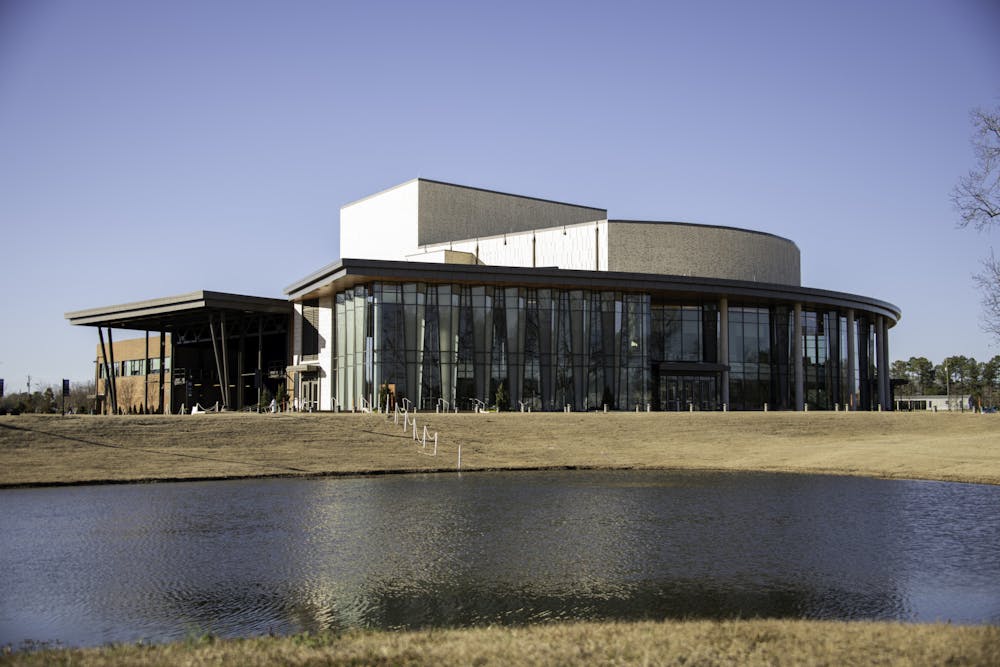On March 14, 2024, the Supreme Court of Alabama held oral arguments on Auburn University’s campus, the second time the court has done so. During the session, justices heard arguments about a medical malpractice case.
This argument comes shortly after the Feb. 20 ruling in LePage v. Center for Reproductive Medicine, which ruled frozen embryos are living beings. This ruling means that Alabama law will hold in vitro fertilization clinics liable for accidental loss of an embryo.
The ruling led to national controversy, leaving citizens with questions about embryos outside of the body and some claiming that the rule is "overstepping."
The argument was held at the Gogue Performing Arts Center at 10 a.m. as part of the court’s mission to “make proceedings more accessible to constituents across the state.” The argument – Ex parte Jackson Hospital & Clinic, Inc. – was a petition of the trial court’s authority for the case of Jackson Hospital’s interpretation of Gov. Kay Ivey’s COVID-19 proclamation. The court deemed the argument “ex parte,” meaning that the argument is in respect to one party, Jackson Hospital.
Ivey's proclamation abolished causes of action for COVID-19 medical attention and made changes in standard care during the pandemic. The argument also questions Alabama’s Emergency Management Act of 1955.
The argument also explores the Alabama COVID-19 Immunity Act, which was passed in 2021 and grants civil immunity to organizations like schools, businesses and churches from lawsuits that place blame onto these organizations for a person contracting COVID-19.
Both acts have raised questions about their constitutionality within the terms of emergency health acts.
The Constitution of the state of Alabama article One, section 35, states that the only legitimate purpose of the government is to protect citizens' rights to life, liberty and property and that when the government assumes other purposes outside of life, liberty and property, it is considered usurpation and oppression.
The court also ruled in the City of Mobile v. Rouse case that "...emergencies do not authorize the suspension of the Constitution, and its guaranties were settled nearly three quarters of a century ago” from ex parte Milligan, 1866.
During the COVID-19 pandemic, Ivey released over 27 proclamations, yet only her first and eighth proclamations were at issue in the case.
The first proclamation said that Ivey amended the Alabama Emergency Management Act of 1955. She said that she amended chapter nine, article one, section 31-9-1, the short title, as well as title six, chapter five, article 29, section 6-5-549.1, also known as the Medical Liability Act of 1987. These amendments state that “alternative standards of care” can be taken up by health facilities, but the degree of care owed to patients would be suspended because of this proclamation.
The eighth proclamation claims businesses have immunity to liability dealing with “death or injury to persons or for damage to property in any way arising from any act or omission related to, or in connection with, COVID-19 transmission…”
This proclamation also states limitations on damages as well as granted causes of action. Section one states that businesses, health care providers or other “covered” entities' liability will be limited to actual economic compensatory damages and will not be liable for non-economic damage. The same section also says that a business, health care provider or other entity will not be liable for negligence for any individual or entity relating to or in connection with COVID-19 transmission.
Chief Justice Tom Parker gave the opening remarks, going over the argument and introducing the other justices and the lawyers on both sides. He also made remarks about his upcoming retirement.
“Alabama has a cap on the age for being a Supreme Court justice, but I’m glad to welcome Sarah Stewart as our next Chief Justice,” Parker said. “I’m in my 19th going on 20th year, and it’s time for me to step down.”
This argument comes nine days after Stewart was elected next chief justice. She won 60.6% of the vote compared to that of her opponent Bryan Taylor who received 39.4% of the vote.
J. Thomas Richie argued for Jackson Hospital in this case. Richie, who works at Becky Southern in Birmingham, practices civil law in Alabama and across the country. He’s best known for working with Jefferson County on tax disputes and bankruptcy cases.
Richie noted that the trial judge did not rule on the constitutionality of Ivey’s proclamations, claiming that the judge “didn’t have time” to reach that point within his argument and his documents. This claim led to confusion among the other justices.
Justice Greg Shaw was most adamant about expressing his and the other justices' confusion, saying that Richie seemed to be “changing his argument” and wasn’t addressing the document submitted to the court.
Moving forward, Richie addressed the constitutionality of the proclamation on the terms that it is constitutional due to the Emergency Management Act, “cutting red tape” that is found in the constitution.
He also made the point that Ivey wanted Alabama citizens to feel and be safe and closed his argument by reading article one, section 35, of the Alabama Constitution that deals with life, liberty and property.
Attorneys Robert E. LaMoine and William Lattimore worked for Theresa Johnson, who filed the case on behalf of her husband Nathan Johnson. LaMoine and Lattimore acted as the respondents for the argument. LaMoine and Lattimore own a joint firm together also located in Birmingham.
They are known to work with injured clients, representing clients that have been harmed due to others' negligence. Their most notable case work is in medical malpractice, environmental harm and personal injuries.
Lattimore noted that without all three claims from sections one and eight in the proclamation, there would be no constitutionality within the legislation. However, he also agreed that Ivey had the best interests of citizens in mind.
Lattimore also worked to address the retroactivity of the trial judge’s decision on the constitutionality and how it worked with the Emergency Management Act as well as the proclamation.
After Lattimore finished with his response, Shaw addressed both sides, claiming both teams did “an amazing job” after “being grilled” by the judges on the stand.
The event closed with Judge Richard Minor giving closing remarks after Parker adjourned the court. The ruling for this argument could take up to 90 days after submission.
Do you like this story? The Plainsman doesn't accept money from tuition or student fees, and we don't charge a subscription fee. But you can donate to support The Plainsman.

Brychelle Brooks, senior majoring in public and professional writing with a minor in information systems, has been with The Auburn Plainsman since August 2023. She previously served as the Campus Reporter, Opinion Editor and Newsletter Editor. She is currently serving as the Editor-in-Chief.





